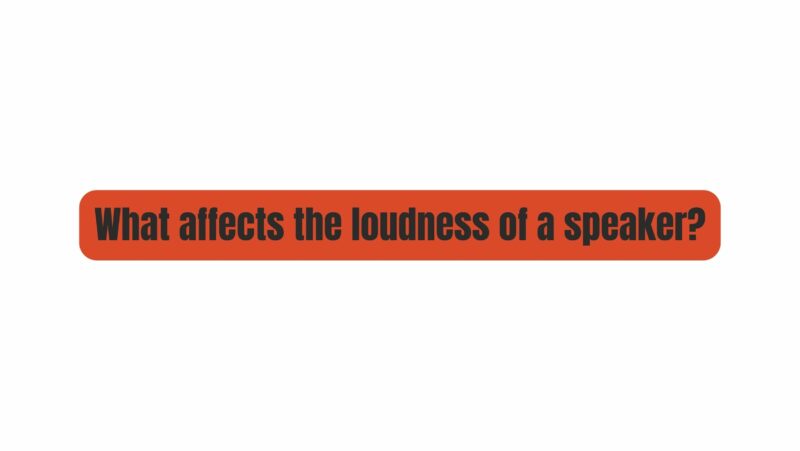In the world of audio equipment, the association between wattage and loudness is a common misconception. Many believe that more watts automatically equate to louder speakers. In this comprehensive guide, we will delve into the intricacies of speaker wattage, clarify its role in loudness, and debunk the myth that higher wattage always means louder speakers.
1. Understanding Speaker Wattage
Before we explore the connection between wattage and loudness, it’s essential to grasp what speaker wattage represents. Speaker wattage refers to the amount of electrical power a speaker can handle and convert into sound. It is a critical specification that significantly influences a speaker’s performance.
2. Speaker Wattage vs. Loudness
While speaker wattage is indeed related to loudness, it is not the sole determinant. Loudness depends on a combination of factors, and understanding this complexity is key to dispelling the wattage-loudness myth.
3. Speaker Sensitivity: The Efficiency Factor
Speaker sensitivity, often measured in decibels (dB), plays a pivotal role in loudness. It indicates how efficiently a speaker converts electrical power into sound. High-sensitivity speakers can produce higher volume levels with less wattage, whereas low-sensitivity speakers require more power to achieve the same loudness. We’ll delve into how speaker sensitivity impacts loudness and why it’s a crucial specification to consider.
4. Room Size and Acoustics
The size of the room in which you use your speakers and its acoustics have a significant impact on perceived loudness. Larger rooms generally require speakers with higher wattage to fill the space effectively. Moreover, room acoustics, including sound-absorbing materials, reflective surfaces, and room dimensions, can either amplify or diminish the apparent volume of a speaker. We’ll discuss how room size and acoustics influence loudness.
5. Amplifier Power and Matching
To achieve optimal loudness, it’s vital to pair a speaker with an amplifier that can deliver the necessary power. Mismatched amplifiers can limit a speaker’s ability to play louder, leading to distortion or damage. We’ll explain the importance of amplifier matching and how it affects loudness.
6. Peak Power vs. RMS Power
Distinguishing between peak power and RMS (root mean square) power ratings is crucial. Peak power represents the maximum short-term power a speaker can handle, while RMS power indicates the continuous power it can handle without damage. We’ll clarify how these specifications relate to loudness and why understanding the difference is essential.
7. Real-World Scenarios
To provide practical context, we’ll explore real-world scenarios where the wattage-loudness relationship varies. From home audio setups to live performances and outdoor events, we’ll discuss why the same wattage can result in different perceived loudness levels.
8. Efficient Use of Speaker Wattage
Understanding that more watts don’t necessarily mean louder speakers doesn’t diminish the significance of speaker wattage. Instead, it emphasizes the importance of using wattage efficiently to achieve the desired loudness without overloading or damaging the speakers. We’ll offer tips on how to maximize the efficient use of speaker wattage.
9. Conclusion
In conclusion, the myth that more watts automatically mean louder speakers is a misconception that can lead to misguided audio equipment choices. While speaker wattage does play a role in loudness, it is just one of several critical factors. Achieving the desired loudness is a nuanced process that involves considering speaker sensitivity, room size and acoustics, amplifier matching, and understanding the differences between peak and RMS power.
By dispelling the wattage-loudness myth and comprehending the intricate interplay of these factors, consumers and audio enthusiasts can make informed decisions when selecting speakers. Loudness isn’t solely about raw power; it’s about optimizing all the variables to create a harmonious and immersive auditory experience that aligns with your unique preferences and requirements.


